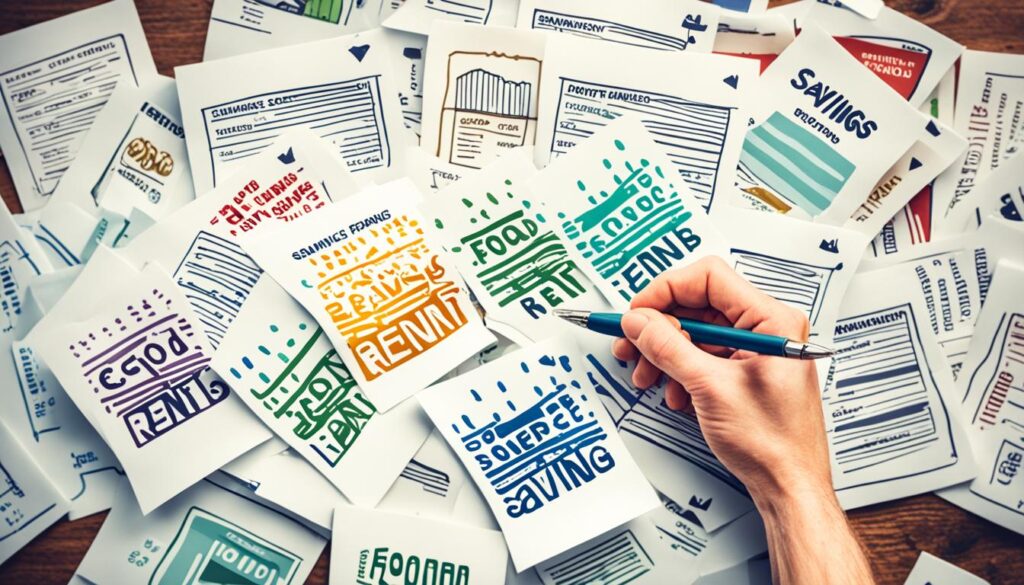Millennials make up the biggest group in U.S. history, with about 72.2 million people. They lost roughly 13% of their earnings in the 2008 recession. Those born in the 1980s are even worse off, with a net worth 34% lower than expected. With nearly $1 trillion in combined debt and average student loans at $32,800, managing money seems hard. Yet, smart budgeting is the key to financial freedom.
Allocating income wisely to needs, savings, debt, and wants can lead to a worry-free financial life. Getting help from a Certified Financial Planner™ can offer tailored financial advice. A common plan is the 50/30/20 rule. This means spending 50% on needs, 30% on wants, and saving 20%.
Keeping track of credit, spending, and all finances helps with managing money. Despite saving at a rate of 9.7%, many millennials worry about their savings. A survey by Goldman Sachs in 2022 showed that 34% feel they’re falling behind in saving. And 46% think they won’t be ready for retirement. They may need about $1.44 million for a comfortable retirement, more than baby boomers did. So, making a detailed budget plan is crucial.
Using these financial planning tips, millennials can better manage their money. This can help them find the peace of mind that comes with being financially secure.
Understanding Your Income and Expenditures
Managing your money well means knowing your after-tax income. You must tell apart necessary expenses from discretionary spending. The 50/30/20 budgeting method is useful for this. It says to use 50% of your income for needs. This includes things like groceries and housing.
Then, it tells you to use 30% for things you want. This can be stuff like eating out and vacations. You should save the last 20% or use it to pay off debts faster.
Knowing how to budget is key for handling your money right. First, look at your paycheck and subtract things like 401(k) contributions. Make sure to start with a small emergency fund. Aim to grow this to several months’ worth of living costs for surprises.
Use budget spreadsheets to sort your spending. This helps you keep track of money and manage it. It’s good to start saving right away, especially for emergencies. Don’t miss out on free money from your job like 401(k) matches.
Next, tackle bad debt with high interest, like credit cards. This saves you from overpaying on interest. After dealing with debt, focus on your retirement savings. Try saving 15% of your salary, including any employer match.
Learning about your money helps you plan better. This way, you can grow your savings and have financial peace.
Choosing a Budgeting Strategy That Fits

Finding the right budgeting strategies is key to good money management. There are many methods out there. Selecting the best one for your aims and way of life is important. From using cash envelopes to tracking every dollar, each has its perks. Reviewing these options helps make a plan that suits your needs.
Setting up automated savings makes budgeting easier. By doing so, you save money regularly without thinking. It helps you meet your financial goals with less work.
Having someone to help keep you on track is important. It could be a friend or an online group. This support makes sticking to your budget easier. It encourages you to keep moving towards a secure financial future.
Practical Tips for Millennial Budgeting
Millennials make up the largest generation in the U.S. But, they face big financial challenges. About 34% feel behind in savings, and many worry about retirement. Here are some budgeting tips for millennials:
Start with a financial self-assessment. Look at your income, expenses, and debts. This helps create a budget that’s easy to follow. A 2022 survey by Goldman Sachs found millennial savings at 9.7%, with debts hitting $1 trillion.
Focus on smart saving and good debt repayment strategies. Many millennials have around $6,521 in credit card debt and $32,800 in student loans. Paying off debt is key to keeping a budget and staying financially stable.
It’s important to keep track of spending to stick to a budget. Yet, be ready to adjust. Your financial situation can change. According to Pew Research, 46% of millennials worry about retirement, needing about $1.44 million saved. This shows the importance of flexible budgeting.
Try different budgeting methods to find what works best. This can help balance strict budgeting and fun spending. Finding this balance is crucial for a budget that lasts.
Smart Budgeting Millennials: Balancing Lifestyle and Savings

Millennials need to learn how to mix fun and savings well. They should look at balancing lifestyle with saving money. Knowing how they spend can help in choosing what’s necessary and what’s not. This makes it easier to use money wisely. Understanding your spending is key.
Owning a house is big for many. It says “I’m on my own” and feels like a win. But houses are expensive and saving for one is necessary. If you start at 25 and save $5,000 each year, you could have $378,519 by 65. Wait until 55 and you’ll have only $65,904. Starting early makes a big difference.
You can find clever ways to save for a house. Try extra jobs, spend less on things you don’t need, or live with family to cut down rent. Making smart choices can help reach your goals. Like living on your own faster.
Looking at different ways to make a down payment helps too. There are mortgages that ask for less up front. Also, automatically putting money away makes saving less stressful. It helps you get closer to buying a home and living a fulfilling life. Exploring down payment options is smart.
Using Technology for Financial Balance
Technology has a big impact on how we manage money today. It gives us great tools for keeping our finances in order. Budget apps are very popular, especially for young people. They make planning your money much easier.
Even though Mint is not around anymore, there are other great apps. You Need a Budget (YNAB) is one of them. It helps you see where your money is going. It also gives tips on how to save better. These apps are easy to use and keep your money in check.
Online spreadsheets also help us a lot. They make it simple to watch what we earn and spend. With these tools, you can make your own budget plan. This helps you keep an eye on your financial journey. There are different types to fit everyone’s needs.
But it’s not all about tracking what we spend. We can also find ways to save more. Digital banks offer high-yield savings accounts and CDs. These can help your savings grow faster. By keeping up with new tools, young people can use tech to live better financially.






